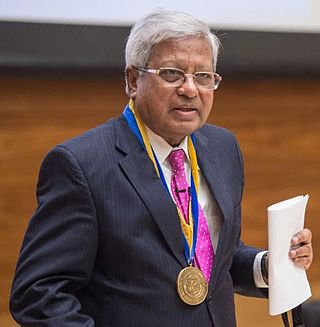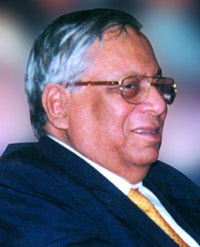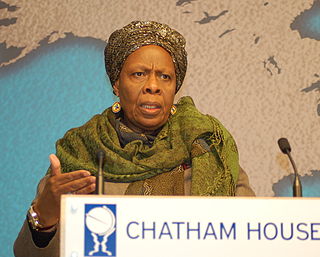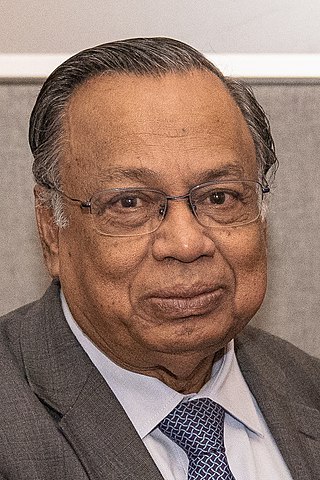Related Research Articles

Politics of Bangladesh takes place in a framework of a parliamentary representative democratic republic, whereby the Prime Minister of Bangladesh is the head of government, and of a multi-party system. Executive power is exercised by the government. Legislative power is vested in both the government and parliament. The Constitution of Bangladesh was written in 1972 and has undergone seventeen amendments.

The Bangladesh Awami League, simply known as Awami League, is one of the major political parties in Bangladesh. The oldest existing political party in the country, the party played a large role in achieving Bangladeshi independence both before and after the Bangladesh Liberation War. It is also one of the two most dominant parties in the country, along with its archrival Bangladesh Nationalist Party. Throughout its tenure as the ruling party from 2009 to August 5, 2024, it has been consistently described as authoritarian.

The Bangladesh Liberation War, also known as the Bangladesh War of Independence and known as the Liberation War in Bangladesh, was an armed conflict sparked by the rise of the Bengali nationalist and self-determination movement in East Pakistan, which resulted in the independence of Bangladesh. The war began when the Pakistani military junta based in West Pakistan—under the orders of Yahya Khan—launched Operation Searchlight against the people of East Pakistan on the night of 25 March 1971, initiating the Bangladesh genocide.

BRAC is an international development organisation based in Bangladesh. In order to receive foreign donations, BRAC was subsequently registered under the NGO Affairs Bureau of the Government of Bangladesh. BRAC is the largest non-governmental development Organisation in the world, in terms of the number of employees as of September 2016. Established by Sir Fazle Hasan Abed in 1972 after the independence of Bangladesh, BRAC is present in all 64 districts of Bangladesh as well as 16 other countries in Asia, Africa, and the Americas.

Moudud Ahmed was a Bangladeshi lawyer and politician. He was a standing committee member of Bangladesh Nationalist Party. Ahmed was elected as a Jatiya Sangsad member total five times from Noakhali-1 and Noakhali-5 constituencies.

Sir Fazle Hasan Abed 27 April 1936 – 20 December 2019) was the founder of BRAC, one of the world's largest non-governmental organizations.

Josephine Teo Li Min is a Singaporean politician who has been serving as Minister for Digital Development and Information, and Second Minister for Home Affairs since 2017. She is also serving as Minister-in-charge of the Cyber Security Agency and Smart Nation Initiative since 2021. A member of the governing People's Action Party (PAP), she has been the Member of Parliament (MP) representing the Kreta Ayer–Kim Seng division of Jalan Besar GRC since 2020.
Movements for Muslim women to seek roles in national leadership have increased rapidly. Greater opportunities for women in education have further encouraged their involvement in politics. The most prominent and important Muslim female leaders are former prime minister of Pakistan Benazir Bhutto, Indonesian President Megawati Sukarnoputri (2001–2004), former Turkish Prime Minister Tansu Çiller (1993–1996), former Senegalese Prime Minister Mame Madior Boye (2001–2002), Bangladeshi Prime Ministers Khaleda Zia and Sheikh Hasina Wajed, former Iranian Vice President Masoumeh Ebtekar (1997–2005), former Malian Prime Minister Cissé Mariam Kaïdama Sidibé (2011–2012), Kosovan President Atifete Jahjaga (2011–2016), former President of Mauritius Ameenah Gurib (2015–2018), former President of Singapore Halimah Yacob (2017–2023) and current President of Tanzania Samia Suluhu Hassan

Humayun Rasheed Choudhury was a Bangladeshi career diplomat and Speaker of the Bangladesh National Parliament from 1996 to 2001. He was elected president of the 41st session of the UN General Assembly in 1986. He was awarded Independence Day Award in 2018 posthumously by the Government of Bangladesh.

Begum Viqar-un-Nisa was the spouse of the Prime Minister of Pakistan from 1957 to 1958.

Sekai Holland is a Zimbabwean former politician who served as Minister of State for National Healing, Reconciliation and Integration in the administrations of President Robert Mugabe and Prime Minister Morgan Tsvangirai. Sekai has been involved in campaigning on a number of human rights issues, including those relating to Aboriginal Australians, apartheid in South Africa and the women's rights and democracy in Zimbabwe.
During the 1971 Bangladesh Liberation War, members of the Pakistani military and Razakar paramilitary force raped between 200,000 and 400,000 Bengali women and girls in a systematic campaign of genocidal rape. Most of the rape victims of the Pakistani Army and its allies were Hindu women. Some of these women died in captivity or committed suicide, while others moved from Bangladesh to India. Imams and Muslim religious leaders declared the women "war booty". The activists and leaders of Islamic parties are also accused to be involved in the rapes and abduction of women.

Shirin Sharmin Chaudhury is a Bangladeshi politician who served as the first female speaker of the Bangladesh Jatiya Sangsad since April 2013 until August 2024. At 46, she became the youngest person to assume that office. She was also the chairperson of the executive committee of the Commonwealth Parliamentary Association between 2014 and 2017. She previously served as the state minister of the Ministry of Women and Children Affairs of Bangladesh.
Begum Khurshida Jahan Haq was the Minister of Women's and Children's Affairs of Bangladesh from 2001 to 2006, serving under her sister, Prime Minister Khaleda Zia. During her term in office, she worked to curb human trafficking of women and children in Bangladesh, as well as to provide programs and services to rehabilitate former victims of human trafficking.
Birangana is the title awarded by the Government of Bangladesh to women raped during the Bangladesh Liberation War by the Pakistan army, Razakar paramilitaries, and their local collaborators.

Abul Hassan Mahmood Ali is the former finance minister of Bangladesh who also served as parliamentarian and cabinet minister including the Foreign Minister of Bangladesh from 2013 to 2019. He previously served as Minister of Disaster Management and Relief from 2012 to 2013.

Asaduzzaman Khan Kamal is a Bangladesh Awami League Politician. He is a former Jatiya Sangsad member representing the Dhaka-11 and Dhaka-12 constituencies. He is a former Minister of Home Affairs of Bangladesh.

Lt. General Ziaur Rahman's tenure as President of Bangladesh started with his acquisition of the presidency from Abu Sadat Mohammad Sayem on April 21, 1977, after the latter resigned from his position on health grounds.
Maleka Khan is a Bangladeshi social worker and activist for the rights of the Birangana, women raped during the Bangladesh Liberation War in 1971.
References
- ↑ "Liberating the Women of 1971". The Daily Star. Retrieved 10 January 2019.
- ↑ Hossain, Hameeda; Mohsin, Amena (2016). Of the Nation Born: The Bangladesh Papers. Zubaan. ISBN 9789385932076 . Retrieved 10 January 2019.
- ↑ Panday, Pranab Kumar (2013). Women's Political Participation in Bangladesh: Institutional Reforms, Actors and Outcomes. Springer Science & Business Media. ISBN 9788132212720 . Retrieved 10 January 2019.
- ↑ Malone, Julia (21 July 1980). "Women's liberation reaches into the world's villages". Christian Science Monitor. Retrieved 10 January 2019.